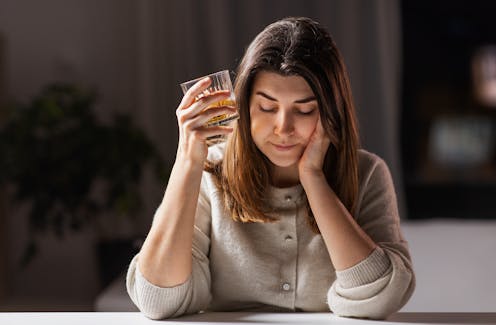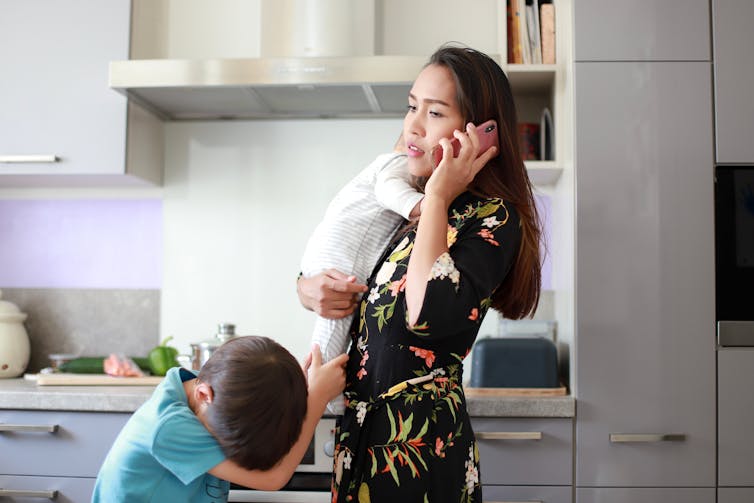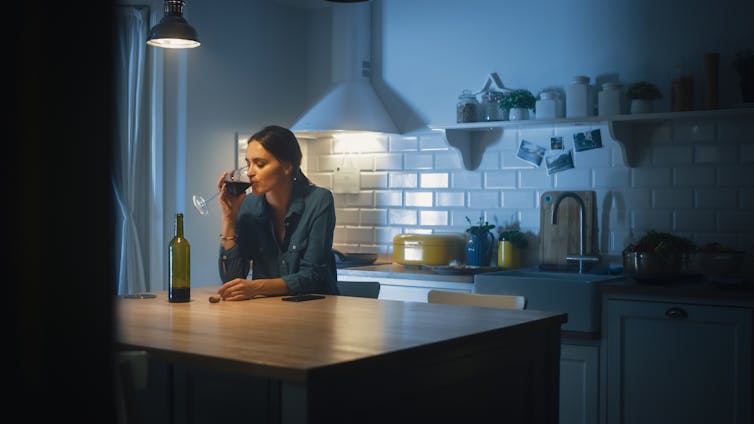Source: The Conversation (Au and NZ) – By Maree Patsouras, PhD Candidate, Centre for Alcohol Policy Research, La Trobe University

Men have historically, and still do, drink more than women. But in recent years there has been an uptick in women’s drinking, particularly among women in their late 30s through to their 60s.
This is concerning, as no level of alcohol is considered safe for our health, and women are especially susceptible to alcohol’s long-term health harms (for example, cancer and heart disease).
We’ve also seen the emergence of the “wine mum” in popular culture and greater social acceptance of women’s drinking.
But women still drink differently to men, and there are some important reasons why – particularly for women who juggle both paid work and motherhood.
In 2022, we conducted interviews with 22 Australian working mothers aged 36 to 51, to learn more about their daily lives and the role alcohol played. Most of the women were middle-class professionals. Many were partnered to men, some were single, and all had school-aged children they looked after alongside their jobs.
We’ve recently published two new papers exploring what we found.
Modern working mothers
Now, more than ever, women are entering the workforce and developing careers. At the same time, many also have to meet the demands of having children. While we like to think we’re moving towards a more equal society, women are still expected to do the majority of childcare and domestic duties.
This means many women are having to do “double shifts” of paid and unpaid labour, increasing the chance they’re stressed, and limiting how much time they have to relax, unwind, and pursue hobbies. This is where alcohol comes in.
Read more:
‘Oh well, wine o’clock’: what midlife women told us about drinking – and why it’s so hard to stop
Most women we talked to felt over-committed because of their competing roles. Whether they had partners or not, they were often taking on the “default” caregiver role. This involved tasks such as getting kids ready for school, cooking, cleaning, and organising appointments.
At the same time, their jobs could be mentally or emotionally stressful, such as working in health care or project management.
And it wasn’t uncommon for these two worlds to overlap. For example, some women talked about needing to send emails or make calls from home outside work hours, or feeling there was an expectation for them to take time off work to take kids to appointments.
Many women were fatigued, and they felt a sense of guilt at not being able to commit fully to either role. As Mia, a full-time employed, partnered mother said:
You’ll spend your life feeling compromised, doing a half job as a parent, and a half job as a worker.

Onjira Leibe/Shutterstock
When participants talked about drinking alcohol, it was something accessible they could do alongside their home duties. For example, a glass of wine while cooking dinner was almost ubiquitous. Drinking helped women manage busy days, and the amount they drunk was not always something they had the capacity to be mindful of. As Caroline, a full-time employed, separated mother explained:
We don’t sit down and stand around like the boys do drinking, with the beer cans round our feet. We drink a glass of wine while we cook tea […] while we’re sitting doing the kids’ homework or arguing with them about, ‘where’s your sock? Where’s your library book?’ […] it makes it very easy to think ‘I’ve only had one glass of wine’ when you’ve had three or four, because you’re not mindful of what you’re doing.
Many of the women we talked to also described feeling under-supported. This included at work, where they felt there wasn’t always enough flexibility to accommodate their parental obligations, and at home, where their partners were not always around to share the workload.
These stresses and pressures meant alcohol became a “prize” or “reward” for getting through the day. And when participants felt particularly stressed or under-supported (which was often), the reward of a drink at the end of the day was all the more important. According to Penelope, a part-time employed, separated mother:
I think that I reach out to drinking at the end of the day because I’m really quite overwhelmed, or quite exhausted mentally and physically from the day.
Read more:
Did you look forward to last night’s bottle of wine a bit too much? Ladies, you’re not alone
What about the pandemic?
Things became even more complicated during the COVID pandemic. Women suddenly took on “triple shifts” – mothering, working and home-schooling – leaving many feeling even more overwhelmed. As Belle, a partnered mother who worked part time, said:
We were all working and trying to home school, and it was just so awful […] so I guess my girlfriends were going through that too, the ones with kids, and they were all definitely drinking a lot more.

Gorodenkoff/Shutterstock
Alcohol was classified as an “essential service” during lockdowns (bottle shops remained open while many other retail stores closed), and against this backdrop, participants felt it became even more normalised. They talked about seeing media depictions and advertising of alcohol, including online memes that made wine out as a way to cope with the pandemic. Belle said:
Everyone would send each other little memes of women just drinking, and it definitely became […] a socially acceptable way of getting through that really shit time.
Hobbies and exercise activities they would previously turn to to relieve stress were often restricted because of the pandemic. As such, alcohol became one of the few things left. Many women we talked to were either drinking more, more often, or felt an increased desire to drink, especially during the height of the pandemic and when they were home-schooling.
To understand why and how modern working mothers drink alcohol, it’s also important to consider how the alcohol industry targets women, often framing alcohol as a symbol of relief and relaxation among busy working mothers.
But it’s equally important to realise being a modern working mother is tough, especially as traditional gender expectations of women as carers persist. Almost 60 years ago, the Rolling Stones sang about “mother’s little helper” in reference to women using substances to manage everyday life.
Until we see changes in the way women are supported at work and home, alcohol may continue being “mother’s little helper” for many working mothers.
![]()
Maree Patsouras receives funding from an Australian Government Research Training Program Scholarship and the Australian Research Council.
Cassandra Wright receives salary funding from the Australian Research Council. She also receives funding from the Medical Research Future Fund, Northern Territory Motor Accident Compensation Commission, Music NT and Menzies School of Health Research internal grant scheme.
Emmanuel Kuntsche receives funding from La Trobe University, the Victorian Health Promotion Foundation (VicHealth), the National Health and Medical Research Council (NHMRC), the Australian Research Council (ARC), and the University of Bayreuth Centre of International Excellence “Alexander von Humboldt”. Emmanuel Kuntsche serves as that Secretary of the Australasian Professional Society on Alcohol and other Drugs (APSAD).
Gabriel Caluzzi receives funding via the Australian Research Council and the Victorian Health Promotion Foundation.
Sandra Kuntsche receives funding from the Australian Research Council.
– ref. Mother’s little helper: interviews with Australian women show a complex relationship with alcohol – https://theconversation.com/mothers-little-helper-interviews-with-australian-women-show-a-complex-relationship-with-alcohol-225285




